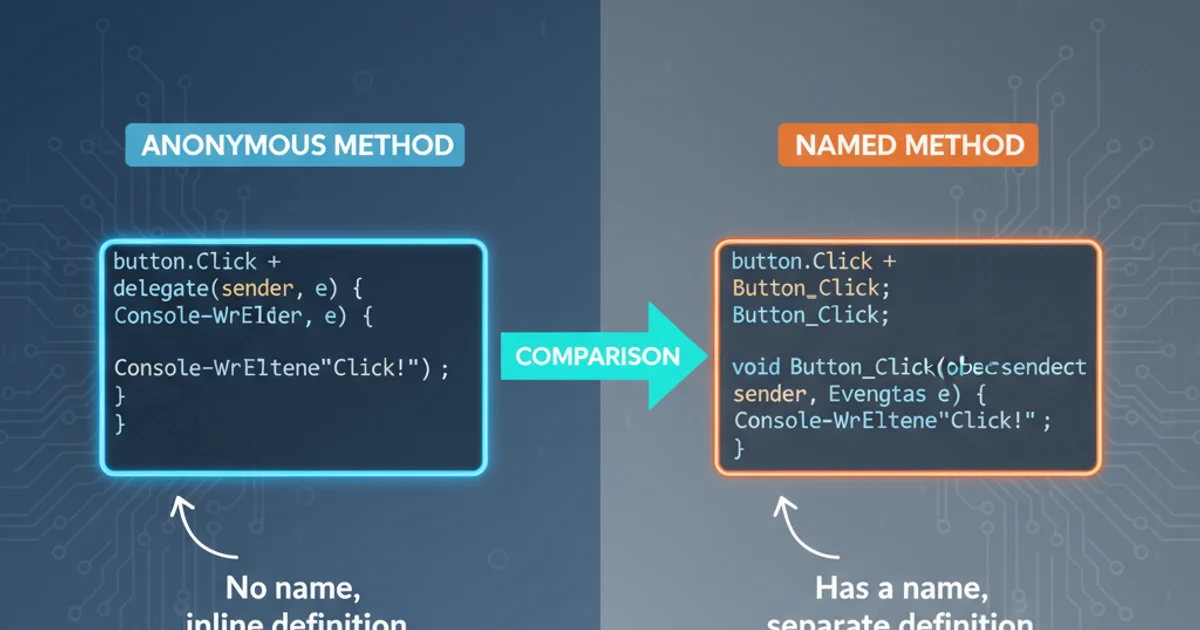C#: Anonymous method vs Named method
Categories:
C#: Anonymous Methods vs. Named Methods - A Comprehensive Guide

Explore the differences, use cases, and performance implications of anonymous methods and named methods in C#. Understand when to use each for cleaner, more efficient code.
In C#, methods are fundamental building blocks for encapsulating logic. Traditionally, methods are declared with a name, return type, and parameters. However, C# also offers anonymous methods, which allow you to define inline code blocks without explicitly naming them. This article delves into the nuances of both named and anonymous methods, helping you understand their characteristics, appropriate use cases, and how they impact your code's readability and performance.
Understanding Named Methods
Named methods are the standard way to define functions in C#. They have a clear signature, including an access modifier, return type, name, and parameter list. They are reusable, can be called from anywhere within their scope, and are generally preferred for complex logic or operations that need to be invoked multiple times. Named methods contribute to code organization and maintainability, especially in larger projects.
public class Calculator
{
// Named method
public int Add(int a, int b)
{
return a + b;
}
public void ProcessNumbers(int x, int y)
{
int result = Add(x, y); // Calling the named method
Console.WriteLine($"Sum: {result}");
}
}
Example of a named method in C#.
Exploring Anonymous Methods
Anonymous methods, introduced in C# 2.0, provide a way to define an inline code block that can be assigned to a delegate. They are 'anonymous' because they don't have a name. Anonymous methods are particularly useful for short, one-off operations, event handlers, or when passing a block of code as an argument to another method. They reduce boilerplate code by allowing you to define the method's logic directly where it's used.
public class EventProcessor
{
public delegate void MyEventHandler(string message);
public event MyEventHandler OnMessageReceived;
public void SimulateEvent()
{
// Anonymous method used as an event handler
OnMessageReceived += delegate(string msg)
{
Console.WriteLine($"Anonymous handler received: {msg}");
};
// Invoking the event
OnMessageReceived?.Invoke("Hello from event!");
}
public void ProcessList(List<int> numbers)
{
// Anonymous method used with a LINQ method
numbers.ForEach(delegate(int num)
{
Console.WriteLine($"Processing number: {num}");
});
}
}
Example of anonymous methods used for event handling and ForEach.
Key Differences and Use Cases
The choice between named and anonymous methods often comes down to reusability, complexity, and scope. Named methods are ideal for logic that is complex, needs to be reused across different parts of your application, or requires recursion. Anonymous methods (and more commonly, lambda expressions) shine in scenarios where you need a short, self-contained piece of logic that is used only once or as an argument to a higher-order function, such as event handlers, LINQ queries, or thread pool operations.
flowchart TD
A[Start] --> B{Logic Reusability?}
B -->|Yes| C[Named Method]
B -->|No| D{Logic Complexity?}
D -->|High| C
D -->|Low| E{One-off Use?}
E -->|Yes| F[Anonymous Method / Lambda]
E -->|No| C
C --> G[End]
F --> GDecision flow for choosing between named and anonymous methods.
Performance Considerations
In most practical scenarios, the performance difference between named and anonymous methods (or lambdas) is negligible. Both compile down to similar underlying mechanisms. Anonymous methods and lambdas that capture outer variables (closures) might incur a slight overhead due to the creation of a compiler-generated class to hold the captured variables. However, this overhead is usually minimal and rarely a bottleneck unless you are creating millions of such delegates in a tight loop. Focus on readability and maintainability first, and optimize only if profiling reveals a specific performance issue related to delegate creation.